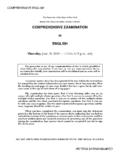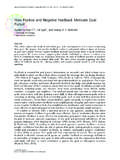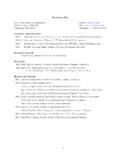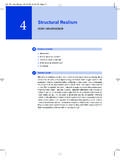Transcription of THE MENTAL STATUS EXAMINATION II ... - …
1 THE MENTAL STATUS EXAMINATION . I. Appearance (observed). II. Behavior (observed). III. Attitude (observed). IV. Level of Consciousness (observed). V. Orientation (inquired). VI. Speech and Language (observed). VII. Mood (inquired). VIII. Affect (observed). IX. Thought Process/Form (observed/inquired). X. Thought Content (observed/inquired). XI. Suicidality and Homicidality (inquired). XII. Insight and Judgment (observed/inquired). XIII. Attention Span (observed/inquired). XIV. Memory (observed/inquired). XV. Intellectual Functioning (observed/inquired).
2 Components of the MENTAL STATUS EXAMINATION I. Appearance (Observed) - Possible descriptors: Gait, posture, clothes, grooming. II. Behavior (Observed) - Possible descriptors: Mannerisms, gestures, psychomotor activity, expression, eye contact, ability to follow commands/requests, compulsions. III. Attitude (Observed) - Possible descriptors: Cooperative, hostile, open, secretive, evasive, suspicious, apathetic, easily distracted, focused, defensive. IV. Level of Consciousness (Observed) - Possible descriptors: Vigilant, alert, drowsy, lethargic, stuporous, asleep, comatose, confused, fluctuating.
3 V. Orientation (Inquired) Possible questions for patient: What is your full name? . Where are we at (floor, building, city, county, and state)? . What is the full date today (date, month, year, day of the week, and season of the year)? . How would you describe the situation we are in? . VI. Speech and Language (Observed). A. Quantity - Possible descriptors: Talkative, spontaneous, expansive, paucity, poverty. B. Rate - Possible descriptors: Fast, slow, normal, pressured. C. Volume (Tone) - Possible descriptors: Loud, soft, monotone, weak, strong.
4 D. Fluency and Rhythm - Possible descriptors: Slurred, clear, with appropriately placed inflections, hesitant, with good articulation, aphasic. VII. Mood (Inquired): A sustained state of inner feeling Possible questions for patient: How are your spirits? . How are you feeling? . Have you been discouraged/depressed/low/blue lately? . Have you been energized/elated/high/out of control lately? . Have you been angry/irritable/edgy lately? . VIII. Affect (Observed): An observed expression of inner feeling. - Possible descriptors: Appropriateness to situation, consistency with mood, congruency with thought content.
5 Fluctuations: Labile, even. Range: Broad, restricted. Intensity: Blunted, flat, normal intensity. Quality: Sad, angry, hostile, indifferent, euthymic, dysphoric, detached, elated, euphoric, anxious, animated, irritable. IX. Thought Processes or Thought Form (Inquired/Observed): logic, relevance, organization, flow and coherence of thought in response to general questioning during the interview. - Possible descriptors: Linear, goal-directed, circumstantial, tangential, loose associations, incoherent, evasive, racing, blocking, perseveration, neologisms.
6 X. Thought Content (Inquired/Observed) Possible questions for patient: What do you think about when you are sad/angry? . What's been on your mind lately? . Do you find yourself ruminating about things? . Are there thoughts or images that you have a really difficult time getting out of your head? . Are you worried/scared/frightened about something or other? . Do you have personal beliefs that are not shared by others? (Delusions are fixed, false, unshared beliefs.). Do you ever feel detached/removed/changed/different from others around you?
7 Do things seem unnatural/unreal to you? . What do you think about the reports in papers such as The National Enquirer? . Do you think someone or some group intend to harm you in some way? . [In response to something the patient says] What do you think they meant by that? . Does it ever seem like people are stealing your thoughts, or perhaps inserting thoughts into your head? Does it ever seem like your own thoughts are broadcast out loud? . Do you ever see (visual), hear (auditory), smell (olfactory), taste (gustatory), and feel (tactile) things that are not really there, such as voices or visions?
8 (Hallucinations are false perceptions). Do you sometimes misinterpret real things that are around you, such as muffled noises or shadows? . (Illusions are misinterpreted perceptions). XI. Suicidality and Homicidality A. Suicidality Possible questions for patient: Do you ever feel that life isn't worth living? Or that you would just as soon be dead? . Have you ever thought of doing away with yourself? If so, how? . What would happen after you were dead? . B. Homicidality Possible questions for patient: Do you think about hurting others or getting even with people who have wronged you?
9 Have you had desires to hurt others? If so, how? . XII. Insight and Judgment (Inquired/Observed) Possible questions for patient: What brings you here today? . What seems to be the problem? . What do you think is causing your problems? . How do you understand your problems? . How would you describe your role in this situation? . Do you think that these thoughts, moods, perceptions, are abnormal? . How do you plan to get help for this problem? . What will you do when _____ occurs? . How will you manage if _____ happens? . If you found a stamped, addressed envelope on the street, what would you do with it?
10 If you were in a movie theater and smelled smoke, what would you do? . XIII. Attention (Inquired/Observed) - Possible descriptors: Attend, concentration, distractibility. A. Digit Span (forward and reverse) - Suggested patient instructions: I will recite a series of numbers to you, and then I will ask you to repeat them to me, first forwards and then backwards. [Begin with 3 numbers not consecutive numbers, and advance to 7-8. numbered sequence.]. B. Spelling Backwards - Suggested patient instructions: Spell the word world.' Now spell the word world' backwards.




